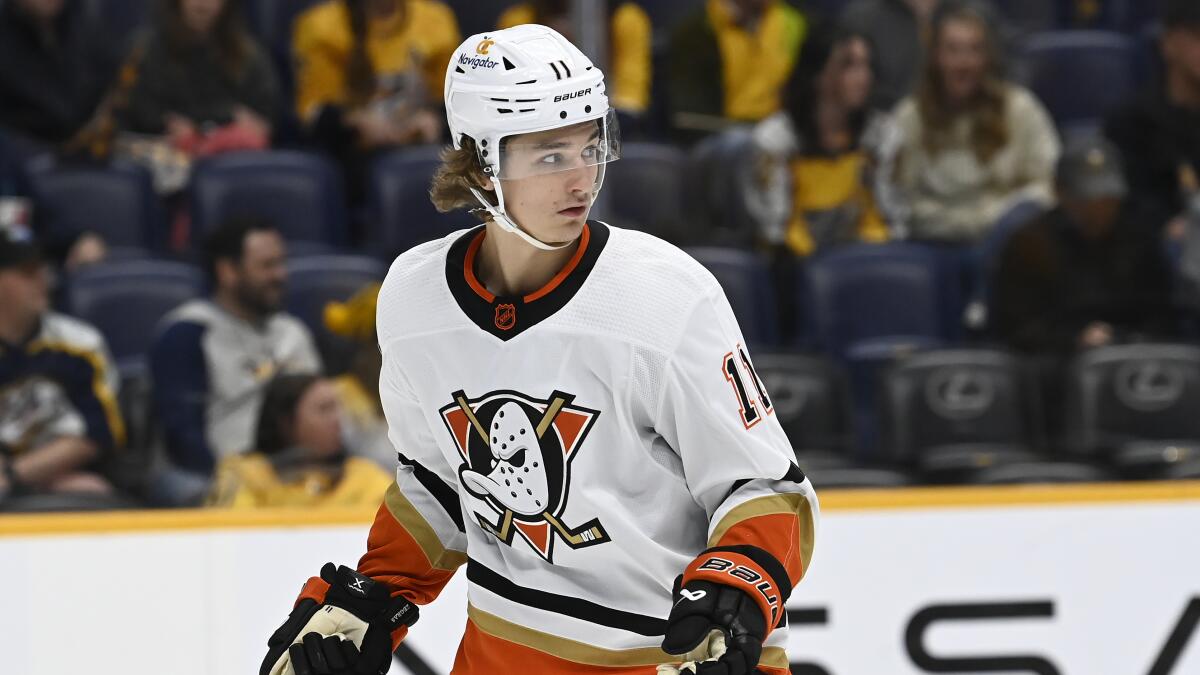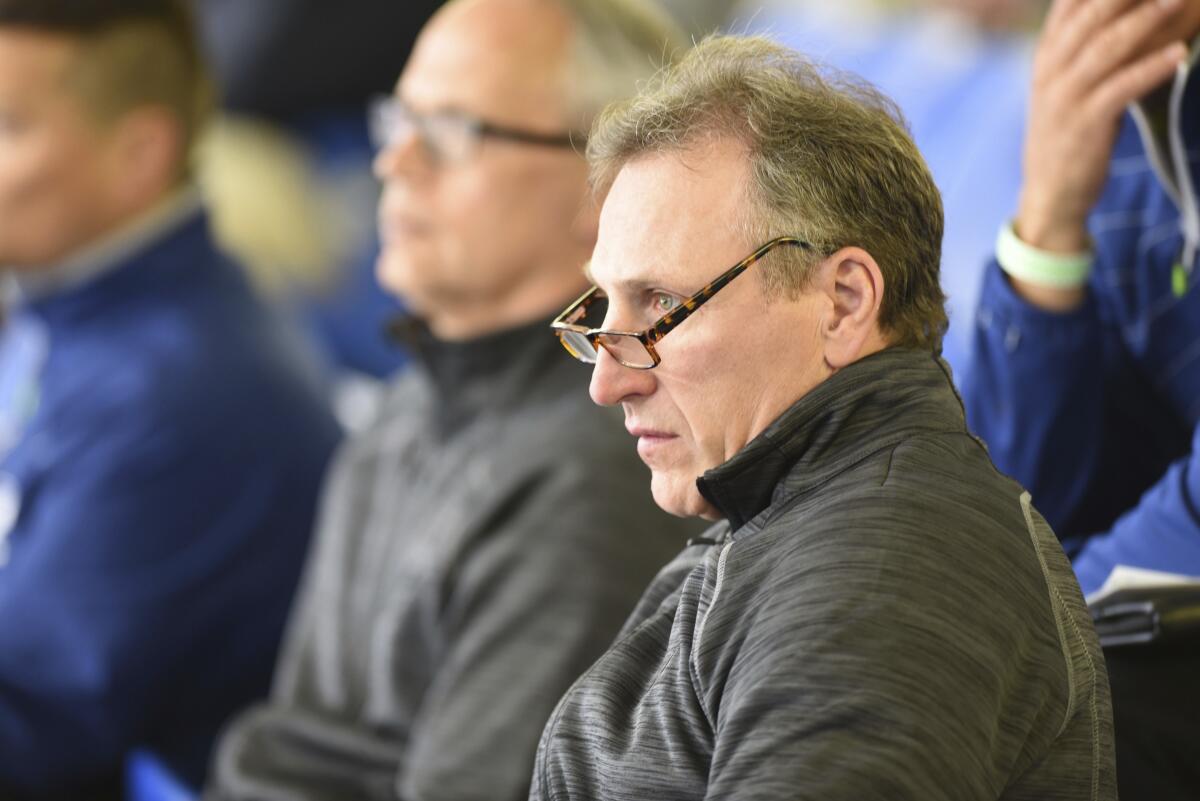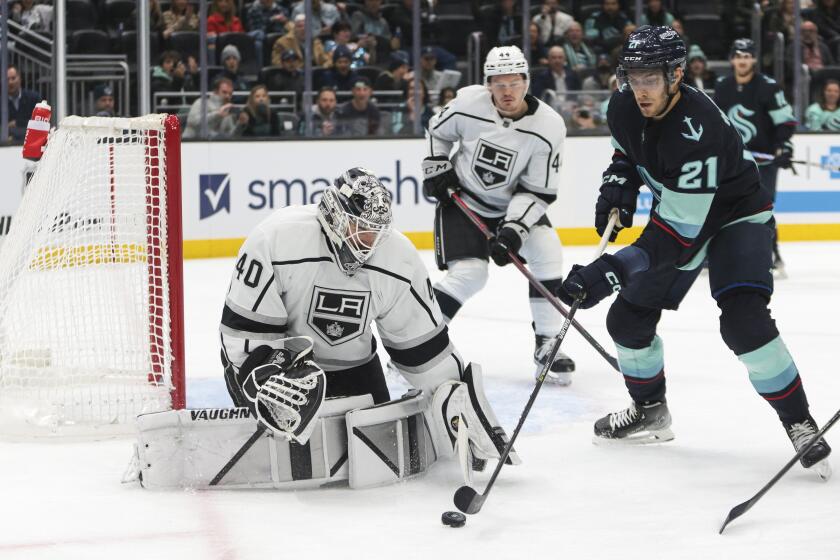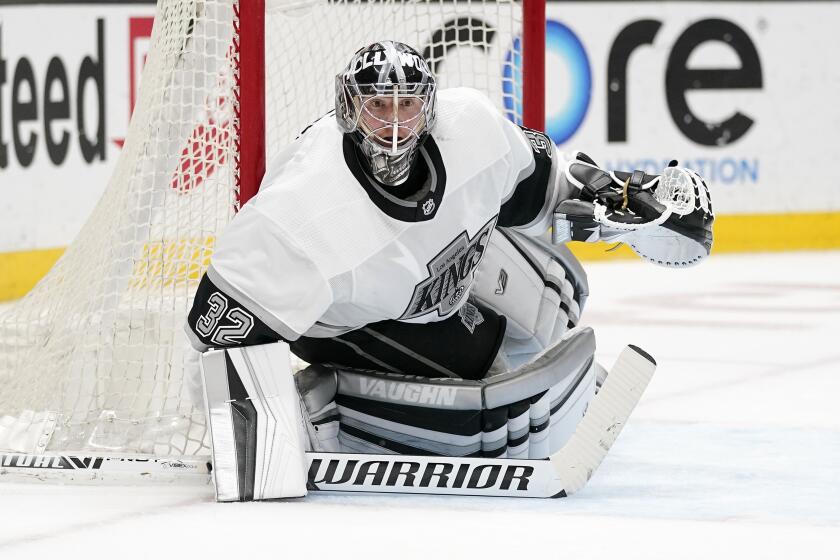Column: Ducks have their own version of ice follies — lots of excitement and losses

- Share via
Ducks forward Trevor Zegras gathered the puck at the center ice dot and slowly swung wide right as he approached goaltender Filip Gustavsson to lead off a shootout last week at Minnesota. As Zegras accelerated he shifted the puck from his forehand to his backhand and back and forth again, his slick hands allowing him to maintain control.
He faked going to his forehand. Gustavsson bought it. Zegras went to his backhand, flicking the puck past the helpless goalie for another highlight-reel moment in his young career.
Zegras, famous for his spectacular lacrosse-style goals, is mesmerizing. So is teammate Troy Terry, who led the Ducks last season in goals (37) and points (67). Both scored goals during regulation time in that game against the Wild. Despite their excellence, the Ducks lost that day, a lamentably familiar result.
Cal Petersen’s waiver situation this week has sent a clear and direct message to the Kings that they need to fix their defense.
Nearly a third of the way into the season, the Ducks are an NHL-worst 7-17-3. They’ve won in regulation once, a 3-2 decision over the New York Rangers on Nov. 23. They’ve won four times in overtime, including a 4-3 victory over the Carolina Hurricanes on Tuesday, and twice in shootouts. They’re giving up the most goals and shots per game in the league and rank near the bottom in scoring.
The Ducks gave up the lead three times Tuesday at Honda Center before Ryan Strome finished off a two-on-one break to end the team’s losing streak at six. They’ve already endured a seven-game losing streak, in October. They’re well on the way to missing the playoffs for the fifth straight season.
But they do have something going for them as they plod toward securing the best odds in the draft lottery: Thanks mainly to the brilliance of Terry, Zegras and rookie forward Mason McTavish — and valiant efforts from overburdened goalie John Gibson — the Ducks are the most entertaining bad team in the NHL.
That can’t be much consolation for them. But for the sake of fans, they’ve at least produced some “wow” moments to break up a dreary season and the long wait for their prospects to blossom.
“I thought the record would be a little better, to be honest with you. But hey, it is what it is,” said general manager Pat Verbeek, who was hired last February, three months after Bob Murray resigned in the wake of accusations of improper professional conduct.
“It’s a tough league,” Verbeek added. “We’ve been in games that we’ve totally blown, making terrible mistakes. This league is not forgiving in that sense. When you make those type of mistakes, it usually goes in the net.”
Verbeek, whose pugnacious playing style earned him the nickname “Little Ball of Hate,” learned early in his career that losing feels terrible. In 1983-84, his first full season, his New Jersey Devils lost 20 of their first 22 games. They didn’t make the playoffs until 1987-88.
But he also knows that winning feels glorious, having been part of Dallas’ 1999 Stanley Cup championship team. He sees only one way to get from the lowest of lows to the highest of highs.

“You keep coming every day to practice to get better. That’s how you get over it,” Verbeek said. “There were times it was complete frustration, playing well and we’d still lose. But when we were 23, 24, we started winning those games. It took experience. It took going through those types of lessons to get through it.”
Lots of those lessons. “Is it good to lose? Yes, at times it is,” he said. “Do you want winning? You do want that, too, just because success is good for your confidence. Winning is good for the confidence, certainly. But I think going through games that we lose is also character-building.”
Which means the Ducks should develop plenty of character this season.
No one, including Verbeek, expected them to contend for the Cup this season. Out of necessity, he traded several veterans and their big contracts last season, acquiring long-term assets but losing short-term depth. It didn’t help when free-agent defenseman John Klingberg underperformed before he sustained a lower-body injury, or that dynamic young defenseman Jamie Drysdale injured his shoulder early. This was projected to be a developmental season. It still is.
Fans have been calling for the job of coach Dallas Eakins, whose one-year contract was inherited by Verbeek, but there’s little reason to expect a change soon. “We’re a month and a half into the season. I need to see more,” Verbeek said.
He’s looking for growth from the kids who will form the Ducks’ core. But the risk of a slow rebuild is that those kids become accustomed to losing and accept it as normal. “Unfortunately, a lot of them have been a part of that over the last few years. You have to just change the culture,” veteran Kevin Shattenkirk said recently. “You have to change the belief in the locker room.”
Veteran Kings goaltender Jonathan Quick is equally deft at turning away competitors for his job and shots on goal, defying time and chasing wins.
Results like their overtime triumph Tuesday help reinforce the value of tenacity and sticking to Verbeek’s plan. “I know they’re being taught and there’s things for them to learn and there’s experiences for them to learn and the only way they can kind of do that is through ice time,” Verbeek said. “They need runway. They need some time.
“I’m just kind of exercising patience right now. I’ve not seen any trends that have got me worried. As long as they keep competing and they keep working, not that losing’s great, but losing is learning as well.”
At this rate, they’ll be well-educated. What they do with their education — as well as the talent they’ve collected and have coming through the pipeline — will determine if the “Little Ball of Hate” can make them not just entertaining but consistently successful too.
More to Read
Go beyond the scoreboard
Get the latest on L.A.'s teams in the daily Sports Report newsletter.
You may occasionally receive promotional content from the Los Angeles Times.









